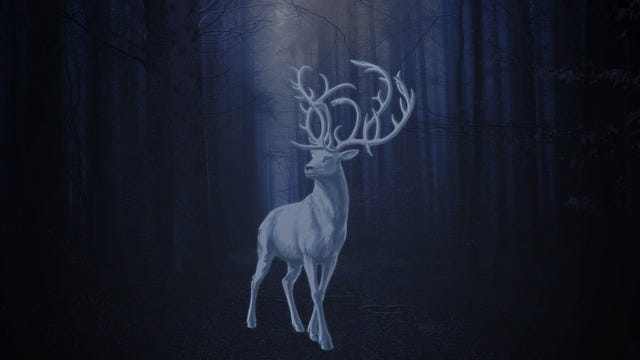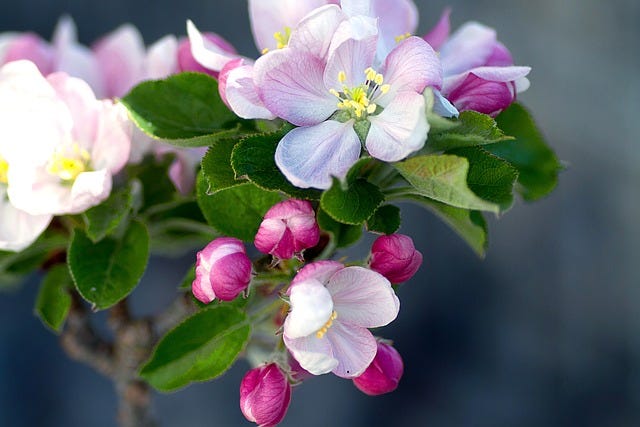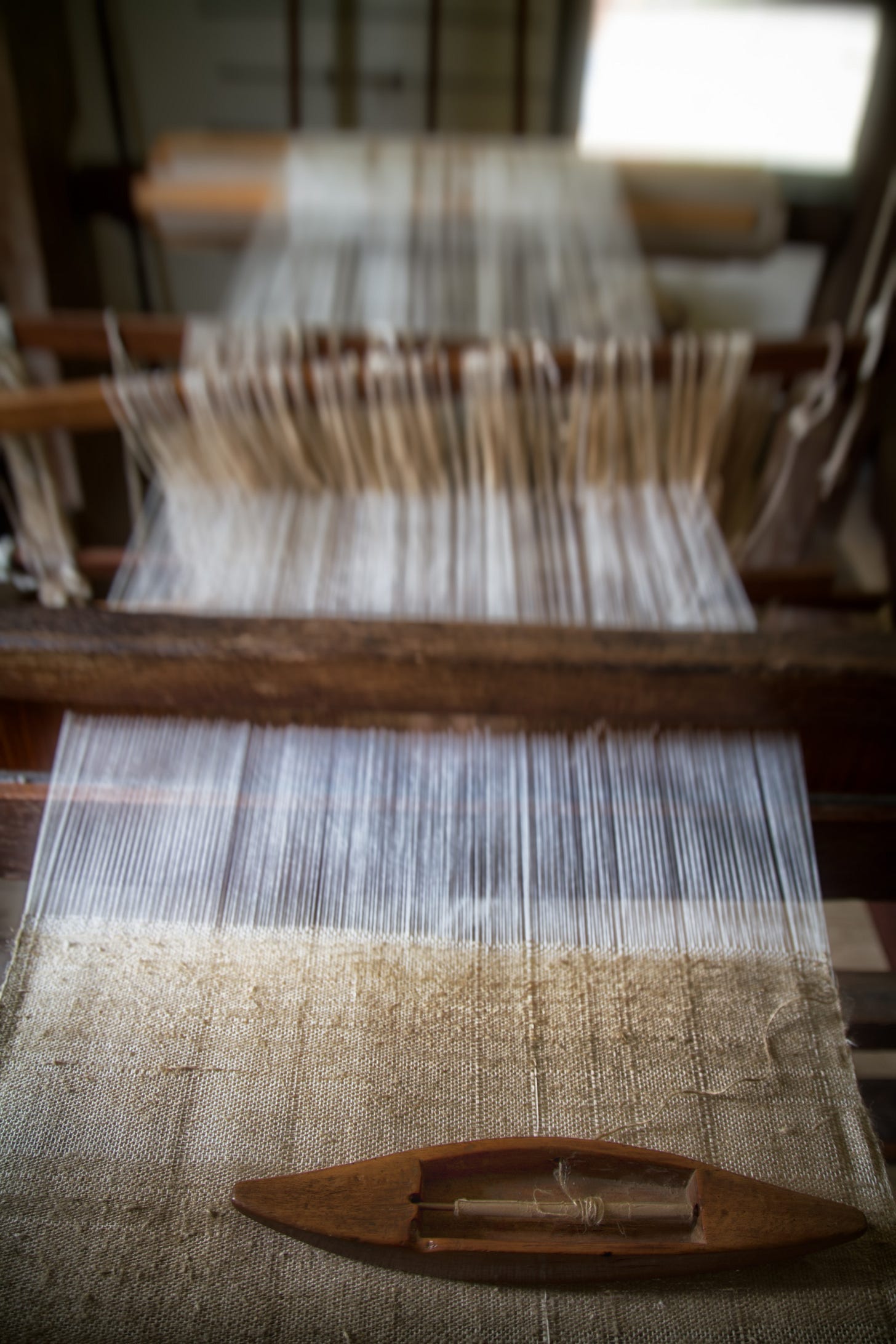The Hanged Man: Part 7: Beltane
Post #64: In which an outsider looks in ...
(If you are a new subscriber, you might want to start at the beginning of The Hanged Man. If you prefer to read Part 7 in its entirety, go here. For the next serial post, go here.)
CHAPTER 25
BRUNO
The man watched Juliana’s house and garden from his place in the tree. It made an uncomfortable perch for his thick body, but he would endure any amount of discomfort in order to satisfy his need to see her. She was too observant to miss signs of his regular visits if he stayed on the ground. He was careful to approach from different directions and made some attempt to move without leaving a trail of tell-tale broken twigs and disturbed ground. The hard tree pressed painfully against various parts of his flesh, adding to his smoldering anger and lust. Her scorn, her coldness, made it necessary for him to crouch here like an animal in the shadows. He hated her. He felt consumed by his need for her. One day he’d make her beg for his attention. He’d make her want him. He’d make her pay. One day he’d take what was his.
MIRMIR
“This is part of Dar’s story,” said the Hanged Man. “I never knew Juliana. Bruno …?”
“Now comess a tale of a dessolate sseed, a tale of unlife, abortion, malformation,” Mirmir reminded him. “Now is a tale of drought, of poisoned ground, of absent sun.”
“The balance,” whispered the Hanged Man. “The story must be balanced.”
“Yess,” assented Mirmir. “Bruno played hiss part, but we won’t linger with him long.” He twined himself luxuriously around the branch from which he suspended the Hanged Man, tensing and stretching his thick coiled body. The tree creaked. “The White Stag knew.”
“The White Stag knows all, and sees all. He might have saved them,” said the Hanged Man.
“The sstory must sstay true to itsself,“ said Mirmir.
“I know,” said the Hanged Man, “let die what must. But I wish…”
“Will you hear the sstory?” interrupted the serpent.
“Go on, then,” said the Hanged Man.
BRUNO
The sound of voices came to the man and he turned his eyes from the house in the clearing to locate the speakers.
He saw a woman with a heavy knot of black hair at her neck. Her companion looked much younger. They carried packs and bundles and their voices mingled with evening birdsong.
“…a place for the night?” the young woman was asking.
“It looks like there’s a clearing ahead. We can camp there.” The dark-haired woman faltered and stopped.
“Rapunzel…do you see it?”
The two stood still, looking away between the trees at something the watching man couldn’t make out. He cursed to himself. Was he going to be seen? What was happening?
Evening mist off the river made the air hazy and heavy. He felt angry at the intrusion. Why did they interrupt what he and Juliana had?
MARIA
The White Stag stepped regally through the undergrowth towards the women.
“What is it?” asked Rapunzel, in a low, awed voice.
“I’ve seen it before,” said Maria, “near the Holy Well of Artemis. It’s a white stag. It’s…otherworldly.”
The stag stopped in front of them and regarded them out of dark eyes. Maria held out her hand, palm up, and the stag briefly dipped his muzzle into it. Maria shuddered at the power of that recognition.
“This is a creature of deep magic,” said Rapunzel. “What does it mean?”
“I don’t know,” said Maria. “But it feels…good. I’m awed by it, but not afraid. It sees me clearly and it…doesn’t mind.”
Rapunzel loosened the straps of her pack and took it off, then turned her back to the White Stag. She didn’t know why she did it but she knew it was the right thing to do. The stag took a step toward her, extended its thick neck in an oddly graceful gesture and laid its muzzle against the exposed nape of her neck. Maria saw Rapunzel clench her hands and heard her involuntary gasp. The stag exhaled and inhaled noisily, once, twice, and then moved its muzzle lower to the damp patch between Rapunzel’s shoulders where the pack had lain.
When Rapunzel turned around her face was pale. She looked at Maria.
“I know,” said Maria. “Me, too.”
“What should we do?” asked Rapunzel.
“Walk on, I think. It will stop us if it wants to.”
Rapunzel shouldered her pack again and they stepped forward. The White Stag turned and walked in front of them, leading the way.
The White Stag led them on a curved path to the clearing. As they stepped out of the trees, the green sound of frogs vibrated joyously. Maria heard the tiny, ear-splitting flutes of peepers, medium-sized croaking and big bullfrogs booming in a glorious and muddled chorus together.
In the clearing stood a tiny house. A small orchard, a large garden, a chicken house and a well clustered around it. The river spread out into bog, curved gently, narrowed and deepened again. Blossoming fruit trees were alive with humming bees. Chickens scratched and wandered about. The garden was neatly fenced, a mixture of newly laid out rows and clumps of old leaves and stalks showing fresh growth.
The White Stag led them into the orchard. Under the trees he paused, regarding them out of dark eyes. He raised his head so his antlers mingled with low branches jeweled with pink blossom. A mist came off the river. Maria never forgot the sight of the glowing, ghostly coat, the crown of pink and white blossoms and background of river mist, all against the clamor of frogs. Fallen petals sprinkled the stag’s shoulder.
Maria heard a step behind her in the orchard grass. She turned and a woman materialized in a pink shirt and rose-colored skirt. The wet hem was stained a richer color of pink. Water beaded her mass of unruly hair. Mist was turning to fog now.
“Hello, my friend,” said the woman, and threw her arms around the stag’s massive neck. “There’s a crown fit for a king. Did you bring visitors?”
The stag nuzzled her affectionately, turned and disappeared into the cloudy air.
“Come in with me. We can’t talk out here!” The woman took each of them by the hand and hurried under the trees. She opened a door at the back of the house, cautioned them to duck under a low lintel, and pulled them inside.
“Stand there a minute while I make a light.”
She shucked off her boots and lit a lamp. Her feet were bare. They stood in a neat kitchen, with butcher block, sink, clean cup and plate drying in a rack.
Gratefully, Maria loosened her straps and took off her pack. With their burdens on the floor, the kitchen seemed at once to be too crowded.
“Come in where we can sit.”
The only seating consisted of a low chair and hassock by the fire and a stool in front of a large loom. The loom, Maria saw, stood empty. The woman tossed cushions onto a cream-colored rug with a rough textured nap in front of the fire and lit lamps.
Her hair was a strange mixture of silver and gold, curling and springing around her face and down her shoulders. Maria judged her to be her own age, possibly older. She sat down in the chair and swung her feet up onto the hassock. A toe ring gleamed.
“I’m Juliana. The White Stag never brought me visitors before. You must be friends!”
Maria and Rapunzel introduced themselves and for some time they sat getting to know one another in the gentle way of women at ease, asking and answering questions and establishing connection in small impersonal ways. Later they shared a meal and later yet they settled down to sleep, Juliana in her bed in a tiny closet of a room off the main room, and Maria and Rapunzel in front of the cold hearth.
The next morning dawned clear and warm and Maria, waking early, searched the river and marsh for any sign of her sons. She slid Juliana’s rubber boots over her bare feet. Outside the door, she met an orange cat, who greeted her in a friendly manner with raised tail and a polite comment. It slipped in as she stepped out.
The morning frog song was muted and her sloshing steps through the bog resulted in temporary pockets of offended silence. The river looked lazy and glassy in the morning light. Drops of water beaded stem, twig, leaf and blade. Later, she would empty her bundles and wash her clothes in the river. She would wash herself, too, stretch out naked and let the current gentle the miles away from her body and hair. Since Rapunzel had stood knee-deep in the river with her while she gave up some of her grief and anger, she felt able to be in water’s healing embrace again.
The well was cool and dark. Ferns grew in crevices between the rocks that made a wall around its throat. She couldn’t see the bottom, but the bucket splashed about ten feet down. The water tasted sweet and green. The grass was sprinkled with violets and a cluster of creamy pink mushrooms.
Juan and Carlos weren’t there.
***
While Rapunzel spent long hours in the garden helping Juliana, Maria sat at the loom. The first morning, Juliana found her sitting on the stool running her fingers longingly over it. Maria had already shared her story.
“I’m between projects, Maria. Would you like to weave something?”
“I couldn’t,” said Maria. But her fingers danced in and out of the strung loom.
“Why not?”
“Then you can’t use it. And I don’t know how long we’ll stay. It’ll take some time. Where would I buy material?”
“Are you afraid?”
Maria swallowed and dropped her hands into her lap.
“Yes.”
Juliana opened a chest against the wall. She came back to the loom with two baskets filled with neatly wound hanks of fiber. “I hope you’ll stay a long time. Rapunzel is going to help me in the garden. Weave me something I can trade during market day.” She looked into Maria’s dark eyes. “Call yourself back, Maria. Call yourself home.”
After a while the cat came in, made a nest, and slept in one of the baskets. At some point, Maria was vaguely aware of voices in the kitchen, but no one disturbed her.
In the evenings, the three women took a lantern and blankets out to the orchard when the weather was fair. If it was foggy or rainy, they made a fire and relaxed on cushions and talked.
Juliana told of her years as Waiting Woman. Rapunzel was delighted with the hidden thin gold chain around her belly and the charm with its single word, “precious.”
They compared stories about the White Stag, Maria and Rapunzel fascinated by Juliana’s night with the stag man.
“What do you think he is?” asked Rapunzel.
“I don’t know. I haven’t tried to know. He’s like the forest made into one being. He’s wild, you know? Untamed. Wise. He gave me what I most needed that night, though I didn’t know exactly what it was myself. He looked into me, somehow.”
“It was like that for me, too,” said Maria. “I stood there feeling so ugly, like a stain in that beautiful place around the Well of Artemis, and the other girls were so innocent and young — unblemished. I wanted more than anything to belong there, to be clean and beautiful all the way through, but I knew I was dirty, foul beyond hope…and then he came and saw me, smelled me, and he accepted me. He didn’t turn away. And I felt…allowed. He gave me what I most needed and wanted, though I didn’t know what that was.”
One evening, as they lay on their backs in the grass under the boughs and watched the night insects twirling around the hanging lantern, Juliana told them about Morfran.
Rapunzel stirred. “It sounds so beautiful. I’m glad to know something like that can happen, that there are men in the world like that. I want something like that. But what if I never find it and I never find anything else, either, because I don’t want to settle for less?”
“Waiting for the right man is twice as hard when you’re waiting with the wrong man,” said Juliana. “Take it from me. I think it’s better to make a life out of loving ourselves than hurt ourselves with something less than we want.”
“Isn’t that like waiting for a prince on a white horse, though?” Rapunzel clapped a hand over her mouth. “My God, what am I saying? I take it back! Spare me the prince on a white horse! Anyway, it wasn’t white. Close up it was a dirty kind of grey.”
Maria said with some exasperation, “Honestly, people lack imagination. Why can’t it be a princess on a black horse with bared breasts and short hair? Why can’t the prince be the one who waits?”
“How about a naked middle-aged broad with a toe ring?” asked Juliana. “Why isn’t anyone dreaming of her?”
“Amen, sister!” Maria nearly shouted.
They filled the orchard with laughter, shocking the frogs into momentary silence.
“I love the frogs,” said Maria when their mirth had subsided and the frogs resumed. “They make me smile. They’re so…”
“Persistent?” asked Juliana.
“Deafening?” said Rapunzel.
“Yes,” replied Maria. “They insist on being themselves. Nobody can make them be quiet.”
“Ah,” said Juliana. “You remind me of a story Morfran told me about a little sparrow called Cassandra…”
“Poor little bird,” said Rapunzel softly when the story was finished. “I’m so glad she flew away.”
“We all flew away,” said Juliana simply.
“Be silent,” said Maria to herself. “Be silent. Yes.”
“Not yes, no!” said Rapunzel.
“I mean no,” Maria laughed, pretending to cower away from her. “I mean, no, I won’t be silent! No! No! Yes, I won’t be silent! No!”
“Oh, shut up!” said Rapunzel, and the three of them lay and sent laughter up to whirl with the light-drugged insects, the blossom-laden branches and the spangled night sky.
The pattern on the loom gradually took shape. Maria never spoke of it beyond asking for opinions about which hank most exactly matched the White Stag’s coat. The colors were different than what Maria used in her old life. Juliana’s yarn was in more neutral, natural shades. She found pink, light but rich, and set that carefully aside. She asked Juliana to save the hair from her comb. In every row, she wove one of the silver or gold hairs. They were all but invisible in the overall pattern but they brought the weaving into subtle gleaming life.
One evening, as the frogs tuned up (Maria thought of it as the time when the thin day shift gave way to the much larger and busier night shift), she asked Rapunzel and Juliana to close their eyes and tell her what color they heard.
“Color?” asked Juliana. “Color of what? What do you mean?”
“Close your eyes,” said Maria patiently. “Now, listen. Can you smell the bog and river?”
“Yes.”
“And the trees blossoming,” put in Rapunzel.
“Good. Now, listen for the color of the evening and everything it contains.”
“Hardly room for anything but the frogs!” said Juliana.
“So, listen. What color are they?”
“Well…” said Juliana slowly. “It’s obvious and maybe not what you want, but…green.”
“Yes,” said Rapunzel, head tilted, eyes closed. “But a thread of brown—there—where the bullfrogs are. A rich brown, but not too dark. Like a cattail, maybe?”
“Like the way the water looks flowing over rocks on an early summer morning. Sort of tea-colored but clear,” said Juliana.
“That’s it!” said Rapunzel. “You’re good at this. Let’s see, what else? Green, and brown… Maybe a hint of blue? Pale blue, like a puddle of water when the mud isn’t disturbed? Or like the river when the sun’s high and the sky’s clear?”
“Thank you,” said Maria, and returned to the loom.
For a long time, Maria had forgotten the place of not thinking. She’d filled the emptiness of thought with memories of Juan and her children the way bitter smoke clouds a fresh sky. Now, weaving again, she rediscovered the inner stillness where nothing existed but color and texture, line and pattern. She didn’t do. She didn’t have. She merely was. Time lost its power. Guilt and shame were absent. Nothing existed but the weaving and the loom. Rising from the stool, straightening her back and neck, remembering how to speak, set a table, prepare a meal, wash an armful of clothes, was an effortful journey from the deep center in which she wove. Falling back into it past the necessity of tasks and communication with the others, past the shoulds and musts of life, past the fear of appearing selfish, lazy or uncooperative, was equally difficult.
Yet the loom called her home and her initial tentative return transformed into calm confidence. She belonged in front of the loom. It was what she was for. What had Mary said? It was her love letter to life.
She wondered how she’d ever left it.
(This post was published with Edition #64 of Weaving Webs and Turning Over Stones.)






